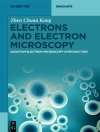ANALYTICAL ELECTROCHEMISTRY
An accessible and robust text with comprehensive coverage of modern electroanalytical techniques and devices
In the newly revised 4th edition of Analytical Electrochemistry, distinguished researcher Dr. Joseph Wang delivers an authoritative and comprehensive discussion of modern electroanalytical techniques and devices. With a strong focus on electroanalysis (as opposed to physical electrochemistry), the book offers readers a thorough grounding in the fundamentals of electrode reactions and the principles of electrochemical methods. It also demonstrates the solving of real-life analytical problems using the techniques discussed within.
This latest edition contains extensive updates to the cited literature and its descriptions of various electrochemical processes and techniques. Additional worked examples are included in the text and numerous quantitative questions and exercise problems are found at the end of each chapter.
Readers will also find:
* A thorough introduction to the fundamental concepts of electroanalysis, including discussions of Faradaic processes, electrical double layers, and the electrocapillary effect
* Comprehensive explorations of the study of electrode reactions, interfacial properties, and controlled potential techniques
* Practical discussions of the practical considerations of electroanalysis, including electrochemical cells, solvents and supporting electrolytes, and instrumentation
* Detailed treatments of potentiometry and electrochemical sensors, including ion selective electrodes, electrochemical biosensors and wearable devices
Perfect for graduate students studying electroanalytical chemistry, Analytical Electrochemistry will also benefit advanced undergraduate students taking courses in instrumental analysis, as well as academics and industrial professionals considering the use of electroanalysis in their labs.
Table of Content
PREFACE
ABBREVATIONS AND SYMBOLS
1. Fundamnetal Concepts
1-1 Why Electroanalysis?
1-2 Faradaic Processes
1-3 Electrical Double Layer
1-4 Electrocapillary Effect
1-5 Supplementary Reading
2. Study of Electrode Reactions and Interfacial Properties
2-1 Cyclic Voltammetry
2-2 Spectroelectrochemistry
2-3 Scanning Probe Microscopy
2-4 Electrochemical Quartz Crystal Microbalance
2-5 Impedance Spectroscopy
3. Controlled Potential Techniques
3-1 Chronoamperometry
3-2 Polarography
3-3 Pulse Voltammetry
3-4 AC Voltammetry
3-5 Stripping Analysis
3-6 Flow Analysis
4. Practical Considerations
4-1 Electrochemical Cells
4-2 Solvents and Supporting Electrolytes
4-3 Oxygen Removal
4-4 Instrumentation
4-5 Working Electrodes
5. Potentiometry
5-1 Principles of Potentiometric Measurements
5-2 Ion Selective Electrodes
5-3 On-Line, On-Site, In-Situ and In-Vivo Potentiometric Measurements
6. Electrochemical Sensors
6-1 Electrochemical Biosensors
6-2 Gas Sensors
6-3 Solid State Devices
6-4 Cross-Reactive Sensor Arrays
Examples and Questions
6-5 Wearable Electrochemical Biosensors
INDEX
About the author
Joseph Wang, Ph D, is Distinguished Professor, SAIC Endowed Chair and Chair in the Department of Nanoengineering at University of California, San Diego (UCSD). He is the Director of the UCSD Center of Wearable Sensors and Founding Editor of Electroanalysis. He is a Fellow of the ECS, Royal Society of Chemistry, and the American Institute of Medical and Biological Engineering.












